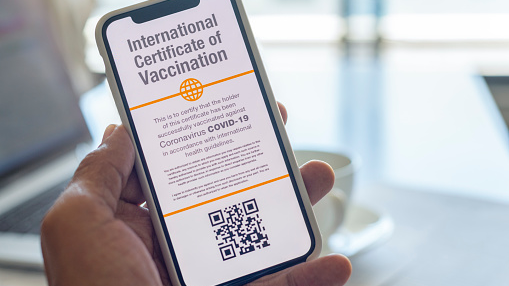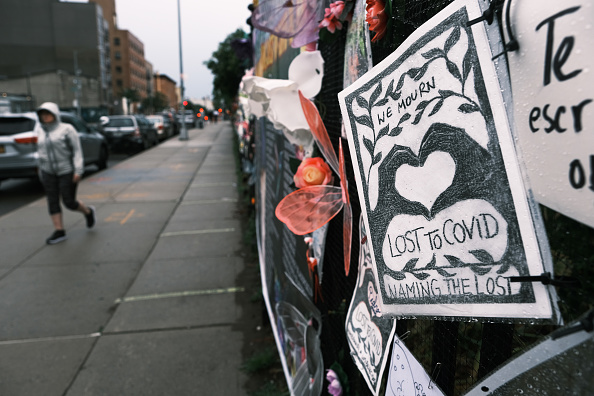
Editor's note: Bradley Blankenship is a Prague-based American journalist, political analyst and freelance reporter. The article reflects the author's opinions and not necessarily the views of CGTN.
The European Parliament on June 9 finally approved the so-called EU COVID-19 passport, which is set to function from July 1 ahead of a much-anticipated summary travel season. The EU Digital COVID Certificate will help the bloc's 27 member states coordinate seamless travel for those travelers that can prove vaccination, testing or having undergone COVID-19, which should be both a huge win for the continent's struggling tourism industry and for EU solidarity.
Despite how hesitant Europeans are to get vaccinated, how rampant anti-restriction sentiment has been around the bloc and "civil liberty" objections from those who oppose the idea of a COVID-19 passport, MEPs approved the regulation with 546 votes to 93 and 51 abstentions for EU citizens, and with 553 to 91 and 46 abstentions for third-country nationals.
The question now remains how successfully this will be rolled out in practice and whether it will be able to revitalize tourism, but all signs look positive.
Other countries around the world have implemented similar digital health certificates, such as China, Japan and the Republic of Korea, but it begs the question why, for example, the United States is not following along. As I've mentioned previously, the EU and U.S. have tended to mirror each other on various COVID-19-related scenarios, so it would make sense that the U.S. would move forward on this issue after how the EU was able to move forward.
However, so far the administration of President Joe Biden has resisted developing a nationwide COVID-19 passport, which is largely owed to the controversy it would cause. Some states in the U.S. like New York and California have implemented their own versions of a COVID-19 passport, while other states like Florida and Texas have outright banned them.
If it wasn't obvious, there is a clear partisan roadblock here: Republican-led states are against them, Democrat-led states are for them, and clearly Biden doesn't want to get in the mix. It reflects the same kind of political cowardice that is already tanking Biden's larger political agenda.

Memorials hang from the front gate of Greenwood Cemetery during an event and procession organized by Naming the Lost Memorials to remember and celebrate the lives of those killed by the COVID-19 pandemic in New York City, U.S., June 8, 2021. /Getty
Memorials hang from the front gate of Greenwood Cemetery during an event and procession organized by Naming the Lost Memorials to remember and celebrate the lives of those killed by the COVID-19 pandemic in New York City, U.S., June 8, 2021. /Getty
Neutrality on this issue from the federal government is foolish because the "civil liberties" argument against COVID-19 passports, which Republican lawmakers are using, make no sense since no one is being forced to use them. All it does is provide a way to verify COVID-19 status (tested, recovered or vaccinated) so that businesses can safely open up and tourism can resume.
Republicans are essentially arguing that they don't want standardized verification, which experts already argue will inevitably cause the coronavirus to find new vectors as things open back up. If public health is the primary concern, then allowing states to take this position is nonsense.
At the same time, it doesn't just make things in the U.S. more complicated, but actually will make things more complicated in other countries. For example, the EU has said that it will soon welcome vaccinated American tourists – and some individual member states have already done so. Without standardized verification, it could mean that Americans could carry forged vaccination cards to the EU and cause new COVID-19 outbreaks by unwittingly bringing the virus with them. Other countries that are allowing vaccinated Americans in could face similar dilemmas.
There's also the issue of people vaccinated in the U.S. who live abroad. Here in the Czech Republic, according to a report by Czech Radio on June 9, some Czechs who were vaccinated in the U.S. were informally recommended by members of the country's health ministry and one of the diplomatic offices in the U.S. to get vaccinated again in the Czech Republic – even though the vaccines offered in the U.S. are also approved by the European Medicines Agency. This is a pretty absurd situation that would be easily rectified by a U.S. COVID-19 passport.
Now, to his credit, Biden has encouraged the private sector to develop a COVID-19 passport to be used in the country – but this raises so many more issues – for example, privacy, cybersecurity or even controversy over which of America's tech cartels would oversee its development. Leaving this issue to the private sector doesn't make sense at all and it shows yet again how toxic American politics is when the federal government can't even do the simplest things.
(If you want to contribute and have specific expertise, please contact us at opinions@cgtn.com.)

